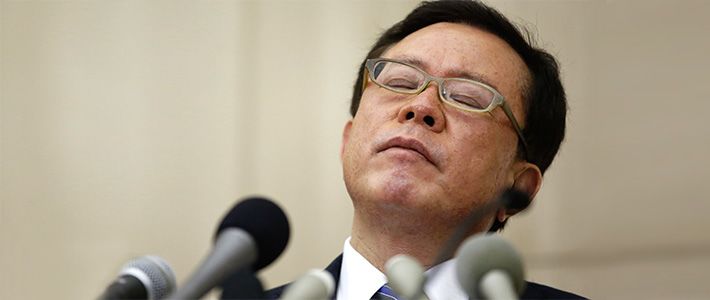
Tokyo Governor Inose Resigns: Brought Down by Money Scandal
Politics- English
- 日本語
- 简体字
- 繁體字
- Français
- Español
- العربية
- Русский
On December 19, 2013, Tokyo Governor Inose Naoki presented his letter of resignation to the president of the Tokyo Metropolitan Assembly, bringing his term in office to a close just a year after his election in December 2012—making him the shortest-lived governor in postwar Tokyo’s history.
Inose is embroiled in an election-financing scandal involving a ¥50 million loan from Tokushūkai, a major hospital operator, which he admits accepting in November last year, just prior to the gubernatorial contest. Despite his claims that the loan was meant for his personal use—the money did not appear on his campaign books as an official donation, making it illegal to take if it did actually go toward election activities—he has spent weeks defending himself from increasingly pointed questioning, both from the press and in the Metropolitan Assembly. His resignation today may put an end to one chapter in this drama, but the possibility of criminal charges still looms.
A Successful Start and a Rapid Post-scandal Slide
Originally an author, Inose won the prestigious Ōya Sōichi Nonfiction Award in 1987 for Mikado no shōzō (The Mikado Code). In 2007 Tokyo’s previous governor—Ishihara Shintarō, also a celebrated author—tapped him to serve as vice governor, a position he held for five years until taking the top spot himself. After Ishihara stepped down to return to the national political scene, Inose won the office with 4.33 million votes, an all-time gubernatorial election record. He rode a wave of popularity up through the signature event of his short time in office, Tokyo’s winning of the 2020 Olympic games in September 2013.
Later in that same month, prosecutors raided the Tokushūkai headquarters in connection with an investigation of House of Representatives member Tokuda Takeshi, the son of Tokushūkai Group founder Tokuda Torao, on suspicion of illegally paying Tokushūkai employees to work on his campaign team during the 2012 general election. (The Public Offices Election Law bans candidates from paying campaign workers.)
Inose states that he returned the ¥50 million on September 25, soon after the electoral irregularities came to light. When the loan details were made public in a November 22 Asahi Shimbun article, though, it touched off the scandal that brought the governor down.
The question goes beyond a politician receiving off-the-books money from a benefactor. In this case, the benefactor is one with interests in Tokyo, and Inose has been in a position to support those interests. In 2010–11, when Inose was vice governor, the metropolitan government provided nearly ¥750 million to Tokushūkai to subsidize construction of an elderly-care center in Tokyo. And in June 2012, Inose represented the Tokyo government—the largest shareholder in Tokyo Electric Power Co.—at the TEPCO shareholders’ meeting, where he urged the company to sell off its Tokyo Denryoku Hospital to help clear the red ink off of its post-3/11 books. If this was meant to open the way for Tokushūkai to increase its business activities in the capital (indeed, group sources state that founder Tokuda Torao told Inose of his desire to purchase the TEPCO facility), then the ¥50 million Inose received from the firm could be viewed as a bribe, rather than a simple donation.
The End of a Short Term in Office
Over the past month the media have ramped up their interest in Inose’s financial dealings. He has also been grilled in more than 20 hours of committee hearings in the Metropolitan Assembly. This questioning prompted Tokushūkai to speak out against the governor’s claims: on November 23, after he stated that he had not asked for a specific amount, a source close to the company claimed that Inose had requested ¥100 million, for example. And Inose’s own claims were inconsistent during the assembly questioning, with shifting details about the safe-deposit box containing the cash and the date when he intended to return the money. This has prompted the body to launch a more powerful special investigative committee to get to the bottom of the matter.
At the press conference today, Inose explained his reasons for stepping down as follows: “I can’t allow this situation to paralyze the metropolitan government any longer, or to delay preparations for the Tokyo Olympics and Paralympics, on which our country’s honor rides.” He also repeatedly called himself an “amateur” at the political game—stronger on the policy side, but unprepared for the political maneuvering the governor’s job calls for. “I hope that our next governor will be a real political pro who can guide Tokyo successfully through the Olympics,” he said.
The election to choose that next governor will likely take place in early February 2014.
(Title photo: Tokyo Governor Inose Naoki announces his resignation. Photo by Reuters/Aflo.)
Governors of the Tokyo Metropolis
| Name | Years in office | Times elected | |
|---|---|---|---|
| 1st | Yasui Seiichirō | 1947–59 | 3 |
| 2nd | Azuma Ryōtarō | 1959–67 | 2 |
| 3rd | Minobe Ryōkichi | 1967–79 | 3 |
| 4th | Suzuki Shun’ichi | 1979–95 | 4 |
| 5th | Aoshima Yukio | 1995–99 | 1 |
| 6th | Ishihara Shintarō | 1999–2012 | 4 |
| 7th | Inose Naoki | 2012–13 | 1 |